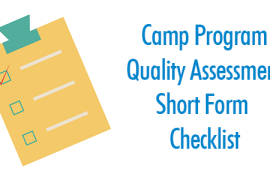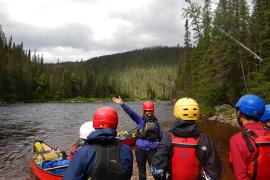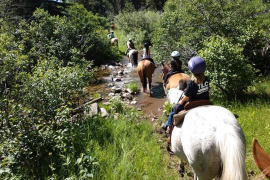Hi everyone! Thanks for joining us as we dive a little deeper into the Research 360 circle; specifically, the part of the circle we are calling "local camps' evaluation capacity." As we've described before, this local camp focus is the center of the circle, around which moves ACA's 5-year research study. With the research team busy getting ready for Summer 2017 data collection, we have some time to explore topics that expand your camp's evaluation capacity. But before we get too technical, we need to ask one big question: Local camps' evaluation capacity for what?
Evaluation Capacity: A Quick Review
You may recall that local camp evaluation capacity refers to the capital- human and otherwise- an individual camp uses to gather information about their campers and programs for decision-making. Evaluation capacity is at the center of ACA's new strategic direction on research and evaluation because it is at that place- at the local camp- where evaluation efforts can have the most direct impact.
That impact, of course, is on the camper. Local camp evaluation capacity refers not just to a camp's resources, but to the ways that camp uses resources to improve their campers' experiences. We know that when campers have fun and learn and grow in the ways we hope, then they have a quality camp experience. A quality camp program, then, is one that continuously strives to improve campers' experiences, because that is what supports their growth.
Introducing: Program Quality
Program quality is the term we use to refer to the ways a camp consistently provides positive growth experiences. Camps, afterschool programs, and other enrichment settings are increasingly interested in program quality for several reasons, such as:
- Research suggests that specific features make up a quality youth program, and together these features can help inform decisions about staff training, program design, and camp policies.
- These features are not necessarily a set of "best practices." They are a position from which camps can incrementally improve existing programs in ways that are consistent with their mission, culture, and camp community.
- Evaluating program quality focuses on features of the camp environment rather than just camper outcomes, because camp professionals have far greater control over these features than over camper outcomes, which are determined largely by camper characteristics and their environment outside of camp.
- Assessing program quality provides camps with an internal frame of reference, meaning all camps can engage in continuous program improvement with improvement measured against only their own baseline.
- Youth programs that use evidence to continuously improve their program quality are more likely to produce their targeted outcomes.
These points are far from a complete list of the reasons many youth development professionals are starting to think more about program quality. It is, however, a glimpse further into the Research 360 circle, and our goal for increasing local camp evaluation capacity: To expand local camps' capacity for using evaluation to provide quality programs.
OK….But What About Outcomes?
Another way to think about evaluation and program quality is in terms of process vs. product. Program quality evaluation focuses more on the process of achieving outcomes rather than the outcomes themselves. This does not mean, however, that program quality does not have anything to do with outcomes- recall I suggested above that program quality is directly linked to outcomes. It simply means that we use evaluation tools to improve program quality and to measure outcomes, because both are important sources of information about our campers and their experiences at camp.
But wait, we need to evaluate program quality and camper outcomes?
It depends. But don't panic yet! Join us for our next Research 360 blog post as we compare program quality evaluation with outcomes measurement and how to expand your evaluation capacity to do both.
In the meantime, check out ACA's free Camp Program Quality Assessment (Short Form) tool, or send us an email if you have any ideas for ways the ACA research team can help support your camp's evaluation capacity.
Laurie Browne, Ph.D., is the director of research at ACA. She specializes in ACA's Youth Outcomes Battery and supporting camps in their research and evaluation efforts. Prior to joining ACA, Laurie was an Assistant Professor in the Department of Recreation, Hospitality, and Parks Management at California State University-Chico. Laurie received her Ph.D. from the University of Utah, where she studied youth development and research methods.
Photo courtesy of Southwoods Summer Camp, Paradox Lake, NY.
Thanks to our research partner, Redwoods.
Additional thanks goes to our research supporter, Chaco.
The views and opinions expressed by contributors are their own and do not necessarily reflect the views of the American Camp Association or ACA employees.





